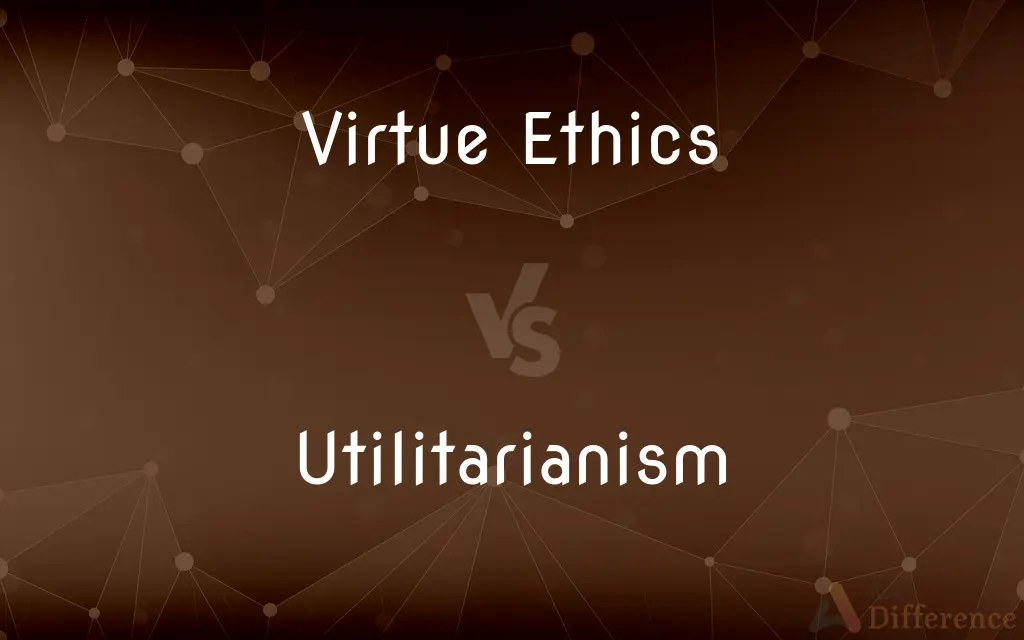Virtue Ethics vs. Utilitarianism — What's the Difference?
By Tayyaba Rehman — Published on December 11, 2023
Virtue Ethics focuses on the moral character of the individual, while Utilitarianism emphasizes the greatest good for the greatest number.

Difference Between Virtue Ethics and Utilitarianism
Table of Contents
ADVERTISEMENT
Key Differences
Virtue Ethics and Utilitarianism are both approaches to ethics, but they come from distinct angles. Virtue Ethics emphasizes the moral character and virtues of the individual, suggesting that good actions flow naturally from a good character. Utilitarianism, on the other hand, is less concerned with the character and more with the consequences of actions. It posits that the right action is the one that maximizes overall happiness or pleasure.
In Virtue Ethics, the primary question is "What kind of person should I be?" It centers on cultivating virtues, like courage and wisdom, which are innate qualities that guide moral behavior. Utilitarianism, in contrast, asks, "What should I do?" It operates on a principle of maximizing overall good, often summed up as the "greatest good for the greatest number."
Virtue Ethics believes that moral understanding comes from personal growth and the development of character. It values individual integrity and the nuances of human experience. Utilitarianism, however, is more pragmatic and quantitative. It evaluates actions based on their outcomes and how much happiness or suffering they produce.
For Virtue Ethics, the rightness or wrongness of an action is determined by the character traits it manifests. An act is good if it stems from virtues and bad if it arises from vices. Utilitarianism determines the morality of an action by examining its consequences; an action is right if it results in the greatest amount of happiness for the most people.
Virtue Ethics can be seen as more personal, focusing on the inner transformation of the individual. Utilitarianism is more societal, assessing actions by their broad impacts on communities or populations.
ADVERTISEMENT
Comparison Chart
Focus
Moral character of the individual
Consequences of actions
Central Question
What kind of person should I be?
What should I do?
Basis of Morality
Development of virtues
Greatest good for the greatest number
Decision-making
Based on character traits
Based on quantifiable outcomes
Scope
Personal and individualistic
Societal and collective
Compare with Definitions
Virtue Ethics
An ethical theory that focuses on moral character.
In Virtue Ethics, it's not just the action, but the character of the person doing it that matters.
Utilitarianism
An ethical theory that emphasizes the greatest good for the greatest number.
Utilitarianism would support a policy that benefits the majority, even if a minority faces disadvantages.
Virtue Ethics
A doctrine that believes good character leads naturally to right actions.
Virtue Ethics emphasizes the cultivation of compassion as a pathway to just decisions.
Utilitarianism
A viewpoint that judges actions by their consequences, especially their ability to increase pleasure or minimize pain.
Utilitarianism would weigh the overall happiness created by a charitable act over the motive behind it.
Virtue Ethics
An approach valuing intrinsic qualities over consequential outcomes.
From a Virtue Ethics standpoint, the journey matters as much as the destination.
Utilitarianism
An approach that seeks the optimal balance of happiness over suffering in decision-making.
Utilitarianism might support a difficult surgery if it promises a higher quality of life afterward.
Virtue Ethics
A philosophy highlighting the importance of developing good virtues and moral character.
According to Virtue Ethics, cultivating honesty is more important than any single honest act.
Utilitarianism
A doctrine that determines the morality of actions based on their results.
Under Utilitarianism, an action is morally right if its outcome leads to the greatest overall benefit.
Virtue Ethics
A viewpoint that considers virtues as the primary determinants of moral behavior.
Virtue Ethics would argue that courage in adversity shows more about a person's morality than any single choice.
Utilitarianism
A philosophy focused on maximizing overall happiness and well-being.
From a Utilitarianism perspective, a tough decision is justified if it leads to broader societal happiness.
Utilitarianism
The belief that the value of a thing or an action is determined by its utility.
Utilitarianism
The ethical theory proposed by Jeremy Bentham and James Mill that all action should be directed toward achieving the greatest happiness for the greatest number of people.
Utilitarianism
The quality of being utilitarian
Housing of bleak utilitarianism.
Utilitarianism
(philosophy) A system of ethics based on the premise that something's value may be measured by its usefulness.
Utilitarianism
(philosophy) The theory that action should be directed toward achieving the "greatest happiness for the greatest number of people" (hedonistic universalism), or one of various related theories.
Utilitarianism
The doctrine that the greatest happiness of the greatest number should be the end and aim of all social and political institutions.
Utilitarianism
The doctrine that virtue is founded in utility, or that virtue is defined and enforced by its tendency to promote the highest happiness of the universe.
Utilitarianism
The doctrine that utility is the sole standard of morality, so that the rectitude of an action is determined by its usefulness.
Utilitarianism
Doctrine that the useful is the good; especially as elaborated by Jeremy Bentham and James Mill; the aim was said to be the greatest happiness for the greatest number
Common Curiosities
How does Virtue Ethics view personal growth?
Virtue Ethics views personal growth and the development of virtues as essential to moral understanding.
In Utilitarianism, what's the main goal of any action?
The main goal in Utilitarianism is to maximize overall happiness and minimize suffering.
Can Virtue Ethics and Utilitarianism overlap in their recommendations?
Yes, sometimes an action can both stem from virtue and lead to the greatest good, satisfying both Virtue Ethics and Utilitarianism.
What does Virtue Ethics prioritize?
Virtue Ethics prioritizes the moral character of the individual.
Can Utilitarianism sometimes support tough decisions?
Yes, Utilitarianism can support decisions that might be tough or controversial if they lead to greater overall good.
Is Virtue Ethics more about the journey or the outcome?
Virtue Ethics values the journey, focusing on the character and virtues developed along the way.
Why might someone choose Virtue Ethics as their ethical framework?
Someone might choose Virtue Ethics if they believe morality is rooted in character and personal virtues.
How does Utilitarianism determine the morality of actions?
Utilitarianism determines morality based on the consequences, aiming for the greatest good for the most people.
How does Utilitarianism view individual rights?
Utilitarianism might sometimes prioritize collective happiness over individual rights if it results in the greatest overall benefit.
Can Virtue Ethics and Utilitarianism be combined?
While distinct, both can be consulted in moral decision-making, though they might sometimes give different recommendations.
What is the primary question of Virtue Ethics?
Virtue Ethics asks, "What kind of person should I be?"
What is the primary concern of Utilitarianism?
Utilitarianism is concerned with what actions should be taken to ensure the greatest overall good.
Do Virtue Ethics and Utilitarianism have any criticisms?
Yes, Virtue Ethics is sometimes criticized for being vague, while Utilitarianism can be criticized for overlooking individual rights.
Share Your Discovery

Previous Comparison
Tai Chi vs. Wing Chun
Next Comparison
Absolute Advantage vs. Comparative AdvantageAuthor Spotlight
Written by
Tayyaba RehmanTayyaba Rehman is a distinguished writer, currently serving as a primary contributor to askdifference.com. As a researcher in semantics and etymology, Tayyaba's passion for the complexity of languages and their distinctions has found a perfect home on the platform. Tayyaba delves into the intricacies of language, distinguishing between commonly confused words and phrases, thereby providing clarity for readers worldwide.
















































